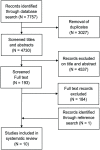Improved Understanding of the Inflammatory Response in Synovial Fluid and Serum after Traumatic Knee Injury, Excluding Fractures of the Knee: A Systematic Review
- PMID: 36661182
- PMCID: PMC10416200
- DOI: 10.1177/19476035221141417
Improved Understanding of the Inflammatory Response in Synovial Fluid and Serum after Traumatic Knee Injury, Excluding Fractures of the Knee: A Systematic Review
Abstract
Background: Traumatic knee injury results in a 4- to 10-fold increased risk of post-traumatic osteoarthritis (PTOA). Currently, there are no successful interventions for preventing PTOA after knee injury. The aim of this study is to identify inflammatory proteins that are increased in serum and synovial fluid after acute knee injury, excluding intra-articular fractures.
Methods: A literature search was done according to the PRISMA guidelines. Articles reporting about inflammatory proteins after knee injury, except fractures, up to December 8, 2021 were collected. Inclusion criteria were as follows: patients younger than 45 years, no radiographic signs of knee osteoarthritis at baseline, and inflammatory protein measurement within 1 year after trauma. Risk of bias was assessed of the included studies. The level of evidence was determined by the Strength of Recommendation Taxonomy.
Results: Ten studies were included. All included studies used a healthy control group or the contralateral knee as healthy control. Strong evidence for interleukin 6 (IL-6) and limited evidence for CCL4 show elevated concentrations of these proteins in synovial fluid (SF) after acute knee injury; no upregulation in SF for IL-2, IL-10, CCL3, CCL5, CCL11, granulocyte colony-stimulating factor (G-CSF), and granulocyte-macrophage colony-stimulating factor (GM-CSF) was found. Limited evidence was found for no difference in serum concentration of IL-1β, IL-6, IL-10, CCL2, and tumor necrosis factor alpha (TNF-α) after knee injury.
Conclusion: Interleukin 6 and CCL4 are elevated in SF after acute knee injury. Included studies failed to demonstrate increased concentration of inflammatory proteins in SF samples taken 6 weeks after trauma. Future research should focus on SF inflammatory protein measurements taken less than 6 weeks after injury.
Keywords: anterior cruciate ligament (ACL); biomarkers; inflammation; meniscus; osteoarthritis (OA); post-traumatic.
Conflict of interest statement
The author(s) declared no potential conflicts of interest with respect to the research, authorship, and/or publication of this article.
Figures
Similar articles
-
Osteoarthritis-related biomarkers profile in chronic anterior cruciate ligament injured knee.Knee. 2020 Jan;27(1):51-60. doi: 10.1016/j.knee.2019.12.007. Epub 2020 Jan 9. Knee. 2020. PMID: 31926672
-
Decreased synovial fluid pituitary adenylate cyclase-activating polypeptide (PACAP) levels may reflect disease severity in post-traumatic knee osteoarthritis after anterior cruciate ligament injury.Peptides. 2019 Jun;116:22-29. doi: 10.1016/j.peptides.2019.04.009. Epub 2019 Apr 27. Peptides. 2019. PMID: 31039374
-
Attenuated synovial fluid ghrelin levels are linked with cartilage damage, meniscus injury, and clinical symptoms in patients with knee anterior cruciate ligament deficiency.Discov Med. 2016 Dec;22(123):325-335. Discov Med. 2016. PMID: 28147215
-
An Evidence-Based Systematic Review of Human Knee Post-Traumatic Osteoarthritis (PTOA): Timeline of Clinical Presentation and Disease Markers, Comparison of Knee Joint PTOA Models and Early Disease Implications.Int J Mol Sci. 2021 Feb 17;22(4):1996. doi: 10.3390/ijms22041996. Int J Mol Sci. 2021. PMID: 33671471 Free PMC article.
-
Synovial Fluid Biomarkers in Knee Osteoarthritis: A Systematic Review and Quantitative Evaluation Using BIPEDs Criteria.Cartilage. 2021 Dec;13(1_suppl):82S-103S. doi: 10.1177/1947603520942941. Epub 2020 Jul 25. Cartilage. 2021. PMID: 32713185 Free PMC article.
Cited by
-
Mechanical loading and orthobiologic therapies in the treatment of post-traumatic osteoarthritis (PTOA): a comprehensive review.Front Bioeng Biotechnol. 2024 Jun 24;12:1401207. doi: 10.3389/fbioe.2024.1401207. eCollection 2024. Front Bioeng Biotechnol. 2024. PMID: 38978717 Free PMC article. Review.
-
Inflammatory synovial biomarkers and state of the tibiofemoral joint in the post-surgical settings: a narrative review.Ann Jt. 2024 Jan 15;9:6. doi: 10.21037/aoj-23-56. eCollection 2024. Ann Jt. 2024. PMID: 38529294 Free PMC article. Review.
-
Inflammatory biomarkers and state of the tibiofemoral joint in the osteoarthritic knee: a narrative review.Ann Jt. 2024 Jun 11;9:27. doi: 10.21037/aoj-23-59. eCollection 2024. Ann Jt. 2024. PMID: 39114418 Free PMC article. Review.
References
-
- Gage BE, McIlvain NM, Collins CL, Fields SK, Comstock RD. Epidemiology of 6.6 million knee injuries presenting to United States emergency departments from 1999 through 2008. Acad Emerg Med. 2012;19(4):378-85. - PubMed
-
- McGuine TA, Winterstein A, Carr K, Hetzel S, Scott J. Changes in self-reported knee function and health-related quality of life after knee injury in female athletes. Clin J Sport Med. 2012;22(4):334-40. - PubMed
-
- Lohmander LS, Englund PM, Dahl LL, Roos EM. The long-term consequence of anterior cruciate ligament and meniscus injuries: osteoarthritis. Am J Sports Med. 2007;35(10):1756-69. - PubMed
-
- Muthuri SG, McWilliams DF, Doherty M, Zhang W. History of knee injuries and knee osteoarthritis: a meta-analysis of observational studies. Osteoarthritis Cartilage. 2011;19(11):1286-93. - PubMed
Publication types
MeSH terms
Substances
LinkOut - more resources
Full Text Sources
Medical


